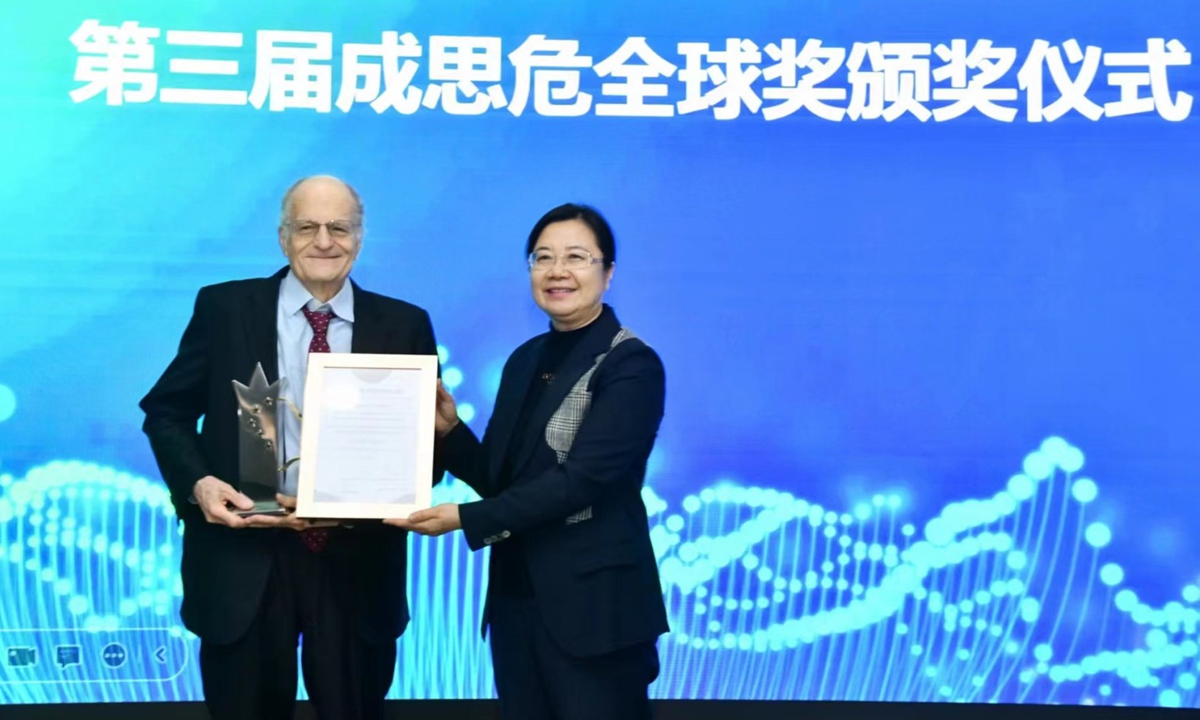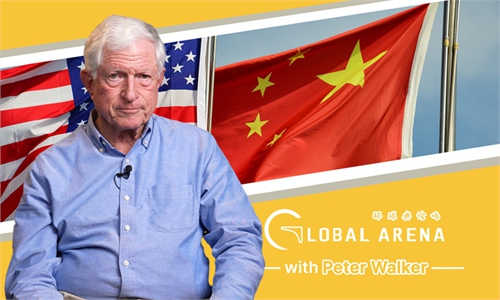US tariffs, chip restrictions stir concerns; China’s abundance of talent sparks optimism for technology progress: Nobel Laureate Thomas Sargent


Chip Photo: VCG
Editor's Note:
In recent years, the US has displayed an increasing willingness to implement tariffs and chip restrictions. These moves have raised concerns about the potential impact on the global economy and cooperation between China and the US. In an interview with Global Times reporter Wang Yi (GT), US Nobel Prize-winning economist Thomas Sargent (Sargent) expressed his optimism regarding China's economic and technological advancements over the medium and long term, despite the imposition of US tariffs and chip restrictions.
GT: As a Nobel Laureate in Economics, you are particularly interested in technology and innovation. How do you view the role of technology in China's economic growth?
Sargent: The word "technology" basically refers to the way we do things. If you look at the way various things are done in China, there have been huge changes, and it's all about technology.
Technology is a good word as it encompasses various aspects of our lives, such as decision-making, communication, education, and trade. If we observe the changes in these areas, I could say there are more changes in China.
The reason behind these changes is the importation and creation of new technologies, which in turn facilitate the exchange of innovative ideas and solutions.
I am not an expert, but I recently had a remarkable experience taking a high-speed train from Shenzhen to Xiamen. Unlike any train in the US, it was a pleasant journey where I could even work comfortably. This example highlights the technological advancements that China has both created and adopted.
GT: How do you view China's economic achievements, especially in the past 45 years since the beginning of reform and opening-up?
Sargent: I would say it's a miracle.
Looking back 45 years, how were the average Chinese people living, and how does that compare to people in different countries? You might conclude that China's living standards were on par with some developing countries, but not as well as some other countries. In response, you might suggest gradually adopting some of the practices and policies that have proven successful in those countries. China took this approach and implemented it with great creativity.
Another aspect of the miracle is that there were other countries facing similar choices, but they did not achieve the same level of success. We can question why these countries did not make the same choice. Therefore, the miracle cannot solely be attributed to economics; it encompasses broader societal factors as well.
Another reason for the miracle that I place significant importance on is Chinese culture. In China, there is a term I often hear - Chinese characteristics. When we examine some of the characteristics I observe, we find a deep respect for tradition, a rich and enduring heritage, reverence for learning, and a strong work ethic. Chinese society values hard work and education. If we were to check off these qualities, they align with what an economist would consider essential for progress.
GT: What is your opinion of China's economic outlook over coming years? Do you believe it will maintain a reasonable growth rate?
Sargent: I am optimistic about the medium- and long-term prospects of China's economy due to the enduring fundamentals that have supported its achievements over the past decades.
The same group of people, Chinese workers and businessmen, are continuing to make it happen. The foundation of China's economic success lies in the country's openness to technologies, promotion of scientific and engineering advancements, and the effective use of incentives by local governments to stimulate growth.
These unchanged fundamentals, combined with the strong work ethic and other Chinese characteristics, will continue to drive positive outcomes, particularly in terms of embracing new technologies.

Thomas Sargent, a professor at New York University and winner of the 2011 Nobel Prize in Economics, receives the Cheng Siwei Global Award at the third "Cheng Siwei Global Award" ceremony in Beijing on December 16. Photo: Courtesy of University of Chinese Academy of Sciences Education Foundation
GT: The US is currently showing a greater inclination toward imposing tariffs and restrictions. What is your perspective on this matter? How do you believe it will impact the global economy and the cooperation between China and the US?Sargent: Tariffs will hurt everybody. That's what the economics teaches. Let me say it carefully, it will hurt almost everybody.
There are individuals in the US who will benefit from this situation. However, it will negatively impact the majority of people who benefit from cross-country competition and collaboration. Specifically, those who do not desire competition, such as steel manufacturers in the US, will benefit from it. While you may think this is desirable, it will ultimately have negative consequences.
GT: International trade has encountered obstacles and protectionism is on the rise. What's your view on political interference in normal trade? How can China and the US work together to improve trade ties?
Sargent: There is a book written in 2017 that is worth reading - Clashing over Commerce: A History of US Trade Policy. It is written by Douglas Irwin and focuses on the history of US tariff policy until 2017. It is important to note that 2017 marks the year of Donald Trump's inauguration. The book delves into the gradual removal of tariff barriers within the US over the span of 50 to 70 years leading up to 2017, as well as the efforts to encourage other countries to do the same. Douglas also explores the economic ideas and political forces that contributed to these developments.
I believe it is crucial to read this book because the ideas and political factions surrounding trade are still relevant today. Most economists advocate for free trade and are critical of both Biden and Trump's trade policies. I can provide you with articles written by esteemed American economists who express their disapproval. These criticisms were prevalent in US politics even before Trump's presidency.
In my opinion, I hope that those of us who support free trade will continue to argue our case and eventually regain support. This is what I believe if you were to ask me. Why did the tariffs happen? The politics within any country are complex, and the US is no exception. It is important to understand that not everyone in the US shares the same viewpoint.
GT: Facing what amounts to economic strangling from the US, can China develop its own strategic supply chain?
Sargent: I'm absolutely sure. I am currently applying economic principles. China has a significant presence in various fields. Here's the thing: the complexity of supply chains. For instance, if we take a phone, such as an iPhone, it is difficult to determine which country it was made in due to the intricate supply chains. The same applies to computers. If we ask where they were made, the answer remains uncertain. These supply chains involve parts from multiple countries. Therefore, if political leaders disrupt these supply chains, the businessmen involved will seek alternatives. Consequently, other suppliers will eventually step in, although not immediately.
One thing I dislike is the ongoing chip wars. It bothers me that the US imposes restrictions on trade of chips. However, when I return to Beijing in 10 years, I believe there will be highly advanced and fast chips that do not rely on US technology. These chips may have different architectures.
Why am I optimistic about this? Because China has a significant number of mathematicians, computer scientists, and engineers, surpassing many other countries. They will undoubtedly demonstrate creativity in various aspects.
GT: How should countries strengthen the coordination of global governance in the face of the rapid development of artificial intelligence (AI) technology?
Sargent: When discussing governance, I believe that the way AI will be utilized is not a new question. People have been using and figuring out how to govern AI for a while now. In my opinion, this decision-making process will occur more rapidly than expected, as various nations will likely reach similar conclusions.
The Q&A transcript was compiled based on the recording of an interview at the third "Cheng Siwei Global Award" ceremony in Beijing on December 16. The international recipient of this year's Cheng Siwei Global Award is a study entitled "Helping bring 'rational expectations' into macroeconomics and time series econometrics" by Thomas Sargent, a professor at New York University and winner of the 2011 Nobel Prize in Economics. bizopinion@globaltimes.com.cn

